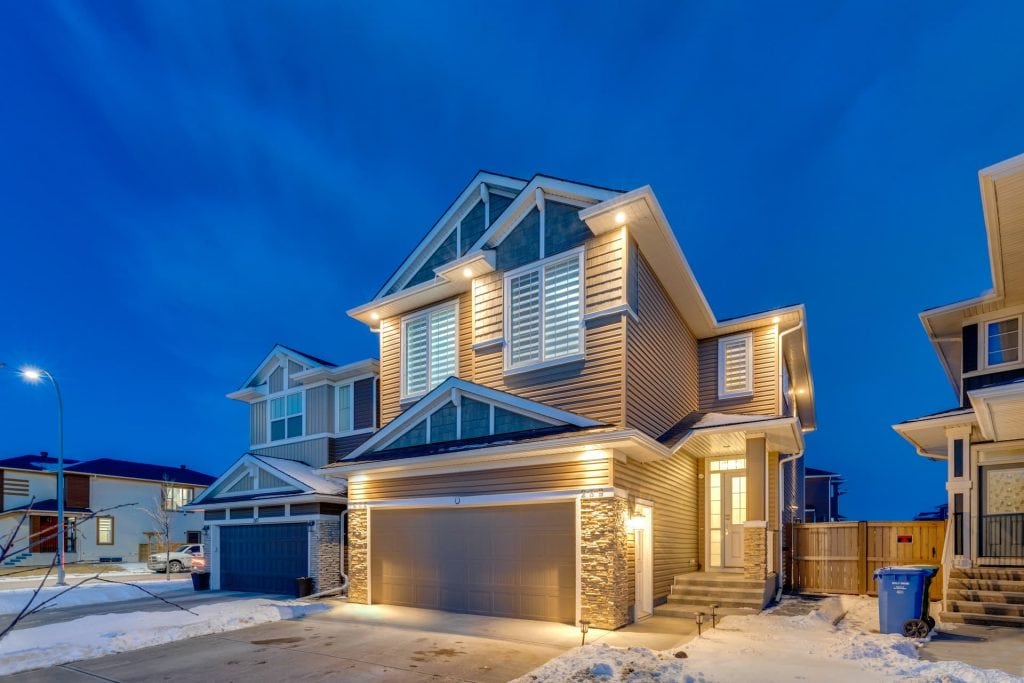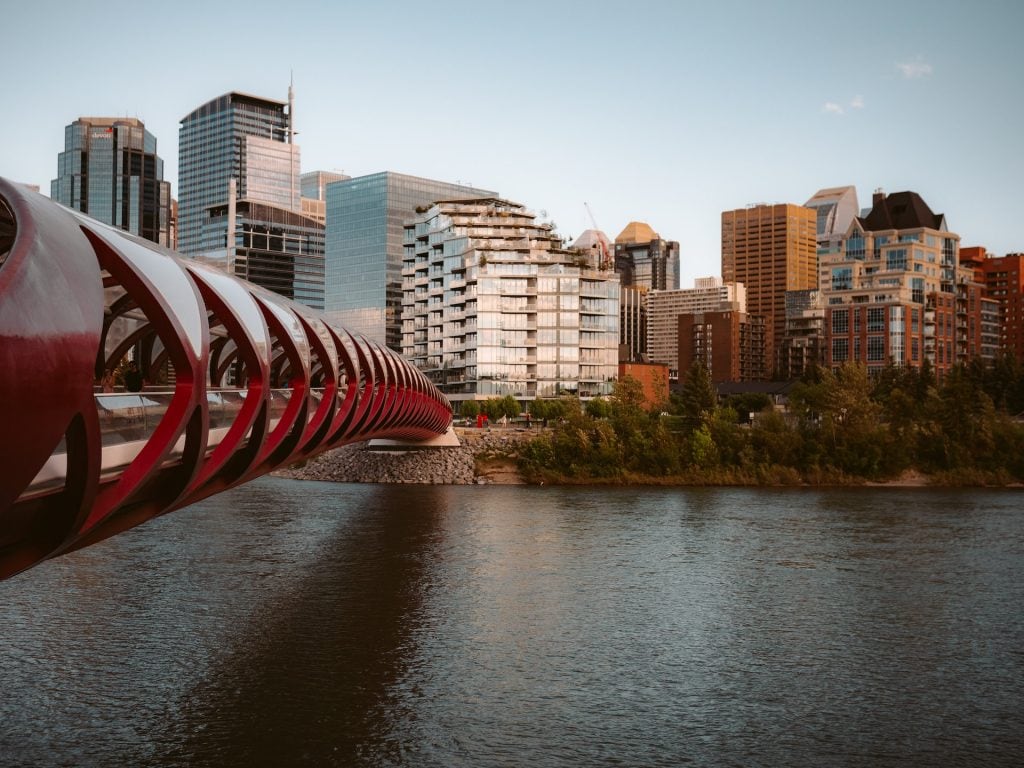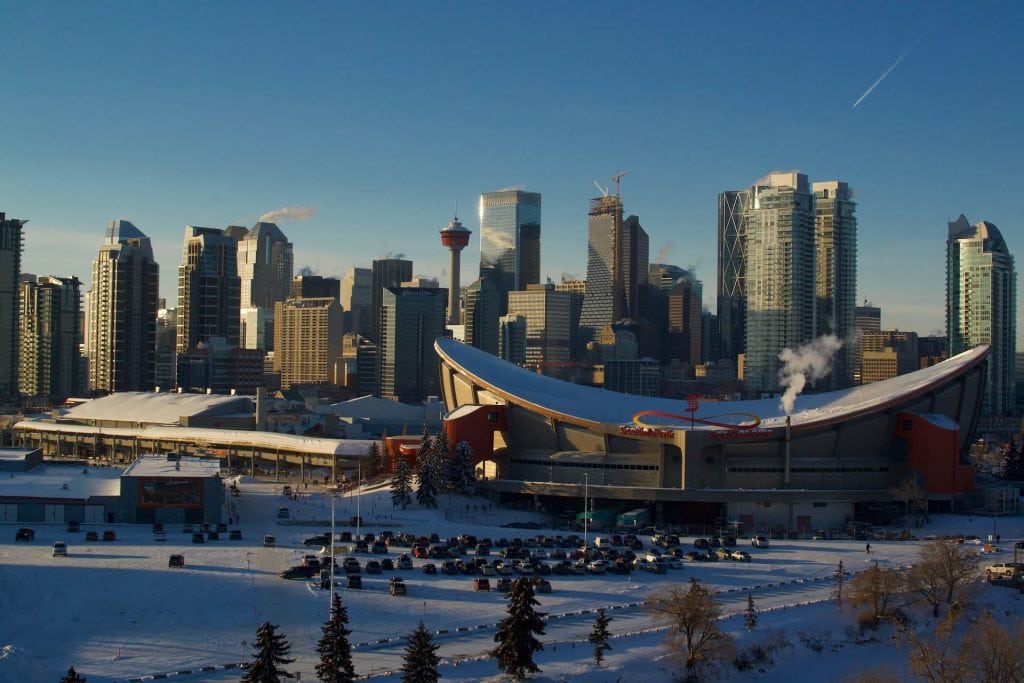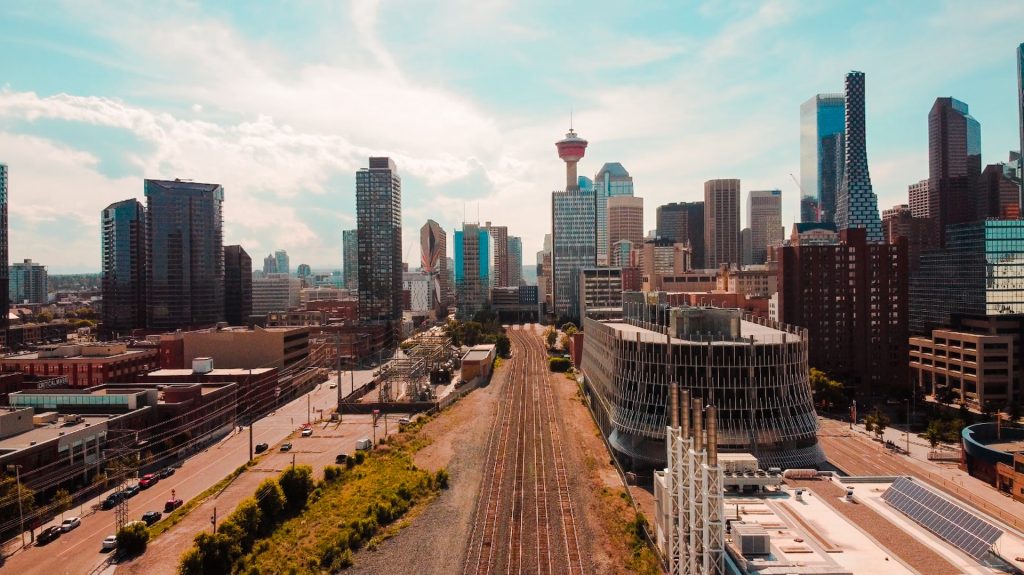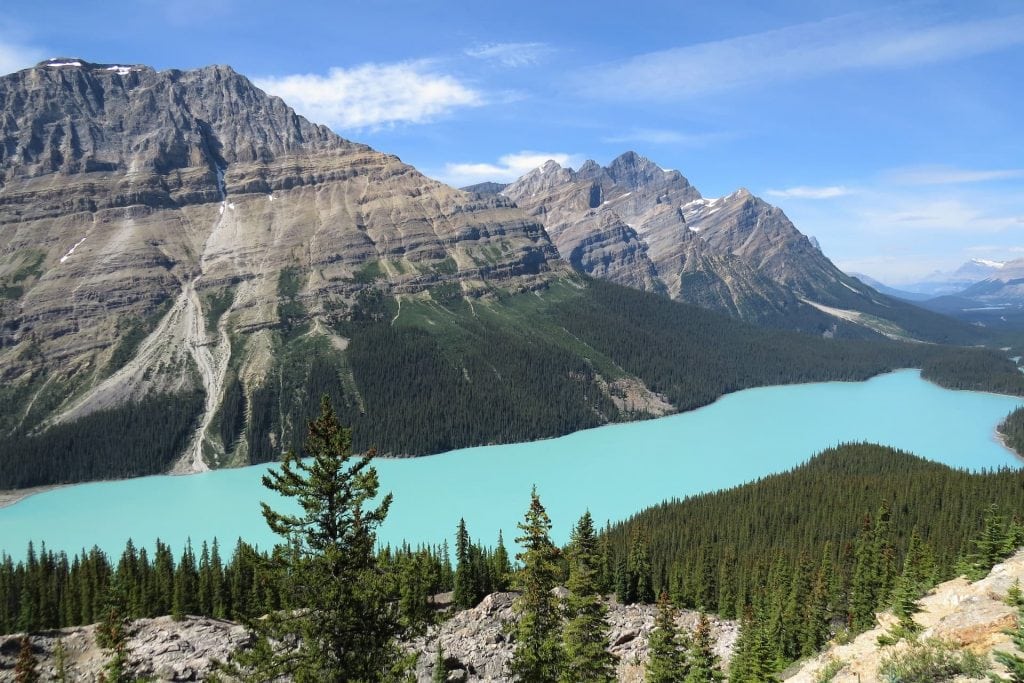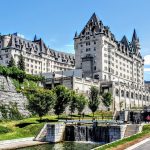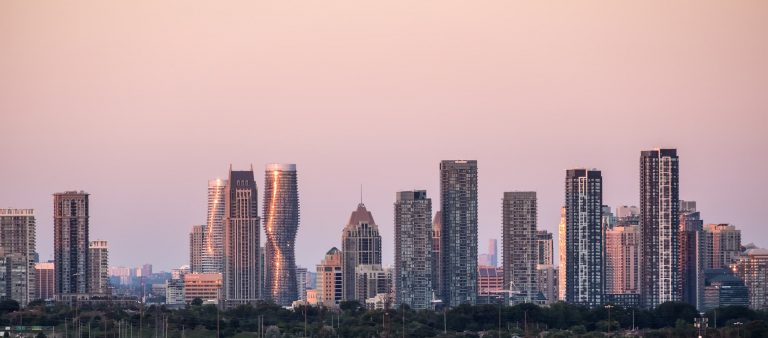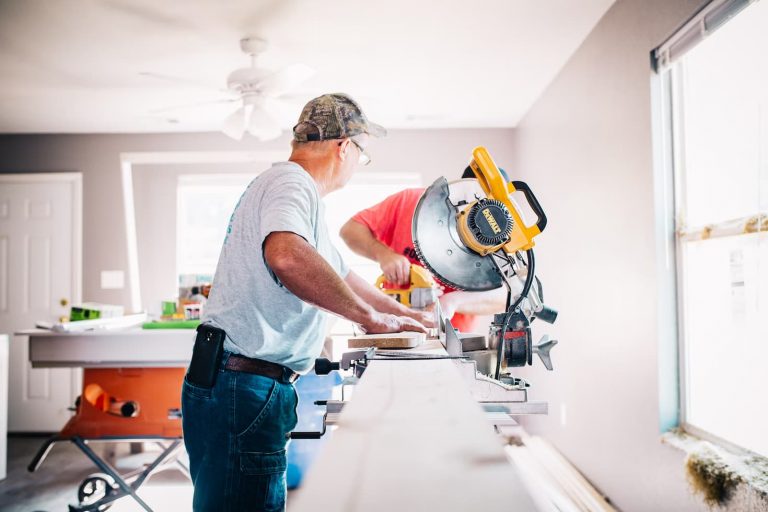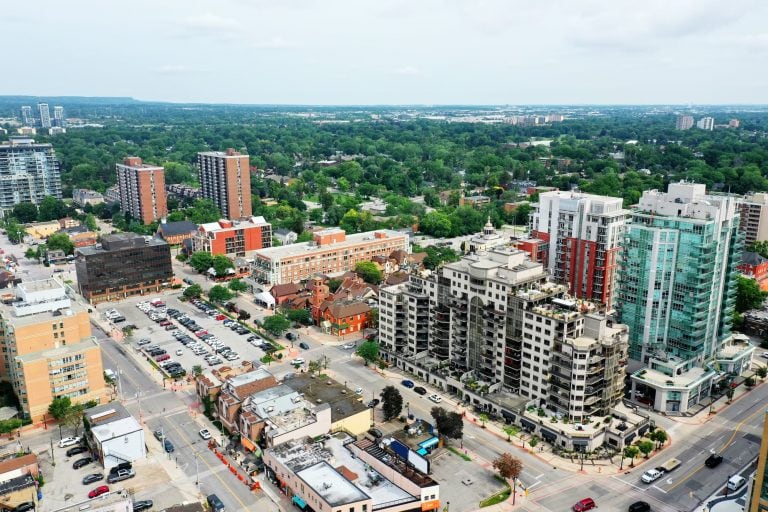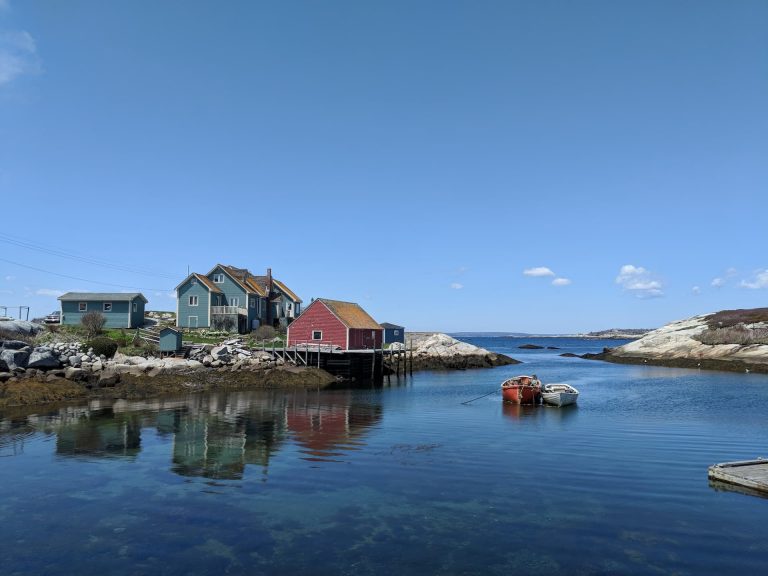Situated in the southern half of beautiful Alberta, Calgary is the biggest city on the Canadian plains and just behind Montreal and Toronto in population. Far from a small western town, Calgary is a metropolitan island in the sea of beautiful farmland, boreal forest, and rugged snowy mountains that make up Alberta. There’s no shortage of reasons to look for homes for sale in Calgary, and if you think this city is right for you check out our Calgary Relocation Guide.
Calgary Relocation Guide: Real Estate
Detached homes make up the bulk of Calgary real estate. The median price for single-family homes in Calgary is $596K, about $800K less than the median in Toronto, and $100K more than in nearby Edmonton. Taking into consideration that Calgary is the third largest city in Canada, real estate in Calgary might seem miraculously affordable.
$500K serves as the border between the low end of the market and the high end. Currently, inventory is lowest in Calgary homes listing below $400K, while the upper end of the market still has plenty of properties for sale. Compared to the GTA, the Calgary real estate market has been stable in its prices, with steady growth from 2000 to 2014, then a plateau from 2014 to 2020 when the market began to appreciate noticeably again. Since 2020 there has been no significant dip in home prices for longer than a few years, so any homebuyers looking to relocate to Calgary can bet on long-term growth and security.
Homes in Calgary
Single-family detached homes in Calgary were mostly built between 1960 and 1980, corresponding to the Alberta oil boom. The next significant generation of houses sprang up in the ‘90s in the wake of the 1988 Calgary Winter Olympics, most famous for the debut of the Jamaican bobsled team. Those Olympic games served as a big surge in the Calgary economy and the housing market.
The majority of Calgary’s land area is given over to suburban housing. Nearly all of Calgary’s commercial and industrial development is located in the eastern part of the city. The newer suburbs such as Arbour Lake feature curving and looping roads lined with large two-storey homes with pine trees out front and fenced-in yards. While older neighbourhoods near the city centre, like Rosedale, have grid-like streets while the homes are generally still quite large and spacious. There are pine and conifer trees everywhere, and virtually every neighbourhood has a park or two within walking distance.
Northeast Calgary has the most homes for sale in the lower end of the market, in neighbourhoods like Falcon Ridge, Saddle Ridge, and Skyview Ranch. You can find up-market homes for sale in Calgary in virtually every part of the city. Calgary might have a few blocks here and there that are rough around the edges, but overall the city has no distinct “do not live here if you can help it” area. If you’re looking for luxury homes, they’re all found right to the west of downtown, especially along the banks of the Bow River.
Condos in Calgary
Calgary’s condo market is located mainly in downtown Calgary. There are a few high-rise properties such as Mark on 10th and Le Germain Residences, both of which offer sleek modern-style condos and luxury amenities. Downtown Calgary has its own forest of skyscrapers, but most of those are office buildings, not condos. Most Calgary condos are low-to-mid-rise properties. Condos usually list between $200K and $500K, so if you find yourself priced out of the low end of the detached housing market, consider buying a condo in Calgary instead.
Calgary Relocation Guide: Schools
As with every big Canadian city, you have roughly four options for primary and secondary education. First, the Calgary Board of Education operates all the public, secular English-speaking schools in the city. The Calgary Board of Education has a budget of over a billion dollars and an average student-teacher ratio of about nine students per teacher. Besides the Calgary Board of Education, you can find great schools under the Calgary Catholic School District, the French-speaking Southern Francophone Education Region No. 4, and a plethora of private schools.
Here’s a brief list of the top schools in Calgary
- Master’s Academy (K-12) Altadore neighbourhood
- Calgary French and International School (PK-12) Paskapoo neighbourhood
- Clear Water Academy (PK-12) CFB Currie neighbourhood
- Renert School (K-12) Royal Vista neighbourhood
- Webber Academy (K-12) Aspen Woods neighbourhood
Calgary Relocation Guide: Economy
Though Calgary is most well known for its oil industry, the city has made important steps to diversify its local economy. Nowadays, Calgary is as much a city of entrepreneurs as it is a centre for industries like chemical manufacturing, supply-chain transportation services, and financial advising and accounting. Thanks to close ties to Edmonton to the north, business in Alberta is booming, especially along Highway 2 which connects the two cities together.
Calgary Relocation Guide: Food
In Calgary, you’ll find well-beloved supermarket chains like Sobeys and Safeways along with more niche grocery stores focused on the Mediterranean and Southeast Asian cuisines. Calgary is slowly building a reputation for its food scene, with Thai, Caribbean, and eastern Mediterranean restaurants quickly becoming local favourites. The dominant food scene in Calgary is Korean food, which ranges from delicious street food to more high-end restaurants.
Calgary Relocation Guide: Weather
Calgary has a varied climate. The western side of the city is significantly higher than the eastern side; a whole 200 metres higher in fact! Western Calgary is classified as subarctic while eastern Calgary is humid-continental. Don’t let ‘subarctic’ scare you though. The winters in Calgary are really no worse than what you’d find in Toronto with lake effect snow to worry about, and it snows considerably less in Calgary than in southern Ontario. That being said, it has snowed at least once every month of the year in Calgary.
If you don’t like the weather in Calgary, just wait a few hours and it will probably change. This means that even in February when it’s -20 out, in the span of a few hours the temperature can rise up past freezing. It’s sunny 322 days out of the year, and the summers are normally warm and very comfortable. Calgary almost never gets tornadoes, though the hailstorms can be otherworldly at times. All in all, Calgary’s weather is milder than what you’ll find in most Great Plains cities.
Calgary Relocation Guide: Transportation
Calgary’s public transportation system is controlled by Calgary Transit, which operates several bus lines and light rail systems throughout the city. The C Train in Calgary is no joke, as it is one of the busiest light rail systems in North America. Nearly half of all the people working in downtown Calgary commute via train, and the system is looking to keep expanding well into the future.
Calgary also has its own international airport facilitating long-distance travel. There are over 200 kilometres of biking paths in the city, and in downtown, most of the skyscrapers are connected by enclosed pedestrian bridges, eliminating the need to walk outside during the coldest days of winter. No matter where you’re going in Calgary, there are usually at least two or three good ways to get there.
Calgary Relocation Guide: Culture
Calgary is a very business-oriented city, but a business city where what you know matters more than who you know. The frontier spirit is still alive and well in Calgary, and so long as you come out here ready to work or pursue your passion, and you do it well, the work should speak for itself. People go to Toronto to get ahead in their careers, whereas people relocate to Calgary to make a career of their own.
Despite being the third-largest city in Canada, Calgary does not feel like a big city. There isn’t much nightlife, not even on the weekends. People tend to spend more time with their family and friends either at home or out in the countryside. If you’re thinking of relocating to Calgary, fun is found mostly outdoors, not in a bar or restaurant downtown.
You’re as likely to go kayaking down the Bow River as you are to go to an art gallery in the city centre. That’s not to say that Calgary doesn’t have its own art scene, it does, but most residents value the artistry of the surrounding landscapes more than the artistry found on a canvas.
Calgary Relocation Guide: Day Trips
If you’re still not sold on relocating to Calgary, consider all the amazing things you can see just a few hours drive from the city. Banff National Park is just an hour and a half away to the west of the city and is only one of many Rocky Mountain Parks near Calgary. Get a yearly pass and you could be hiking and camping in some of the prettiest landscapes in Canada any weekend you please if you relocate to Calgary.
There are also several lovely lakes like Travers Reservoir where you can enjoy watersports and excellent fishing. The landscape around Alberta is worth any day trip to the sea. In the early summer, the grass is emerald green, and as summer wears on its crisps into a lusterful brown colour accentuated by the sunsets. If you’re looking to do some stargazing or amateur astronomy, Alberta’s nearly perpetual clear skies and lack of light pollution make sighting shooting stars and the moons of Jupiter a breeze. Just drive about an hour east or west of Calgary and you’ll be under the darkest skies possible.
Calgary Relocation Guide: Get Your Kids Prepared
If you have little ones, the prospect of moving to a strange faraway place can be both exciting and terrifying. To save them from being overwhelmed, spare their room/play space as long as possible from being disturbed. When it is time for them to pack up their toys and blankets, get them to help. If they put their toys away themselves, see in which box they go, and see where that box goes into the moving truck, chances are they’ll understand that moving is only temporary. Moving can be hardest on kids who might have to cut ties with the only world they’ve ever known, with the first friends they’ve ever made, their favourite playgrounds, you name it. To have a successful relocation to Calgary, don’t forget to get your kids involved.
Calgary Relocation Guide: Before Moving Out, Ditch What You Don’t Need
The less stuff you bring with you when you relocate to Calgary, the easier that relocation will be. We recommend you go through your belongings, everything from clothes, books, kitchenware, and make three piles: a keep pile, a trash pile, and a donate pile. Keep what you must, donate what you can, and throw away the rest. It might be painful to part with that hoodie from your freshman year of college, but at the end of the day, it’s just extra mass that will weigh down the relocation process.
Calgary Relocation Guide: Should I Use A Moving Company?
If you’re relocating to Calgary and you don’t have any friends or family in the area who can help you haul in your sofa and bed frames, it might be a good idea to hire some helping hands to save yourself from toil and exhaustion. Calgary is host to a ton of great professional moving companies who, because Calgary is one of the largest cities in Canada, have lots of experience moving in people from all over. Some of the top moving companies in Calgary include Calgary Professional Movers Inc, Calgary’s Best Moving, and Super Powers Inc.
Calgary Relocation Guide: Conclusion
Now that you’ve had a long look at what our Calgary Relocation Guide has to offer, get in touch with a real estate agent today, and learn how to put an offer on a home for sale in Canada.


